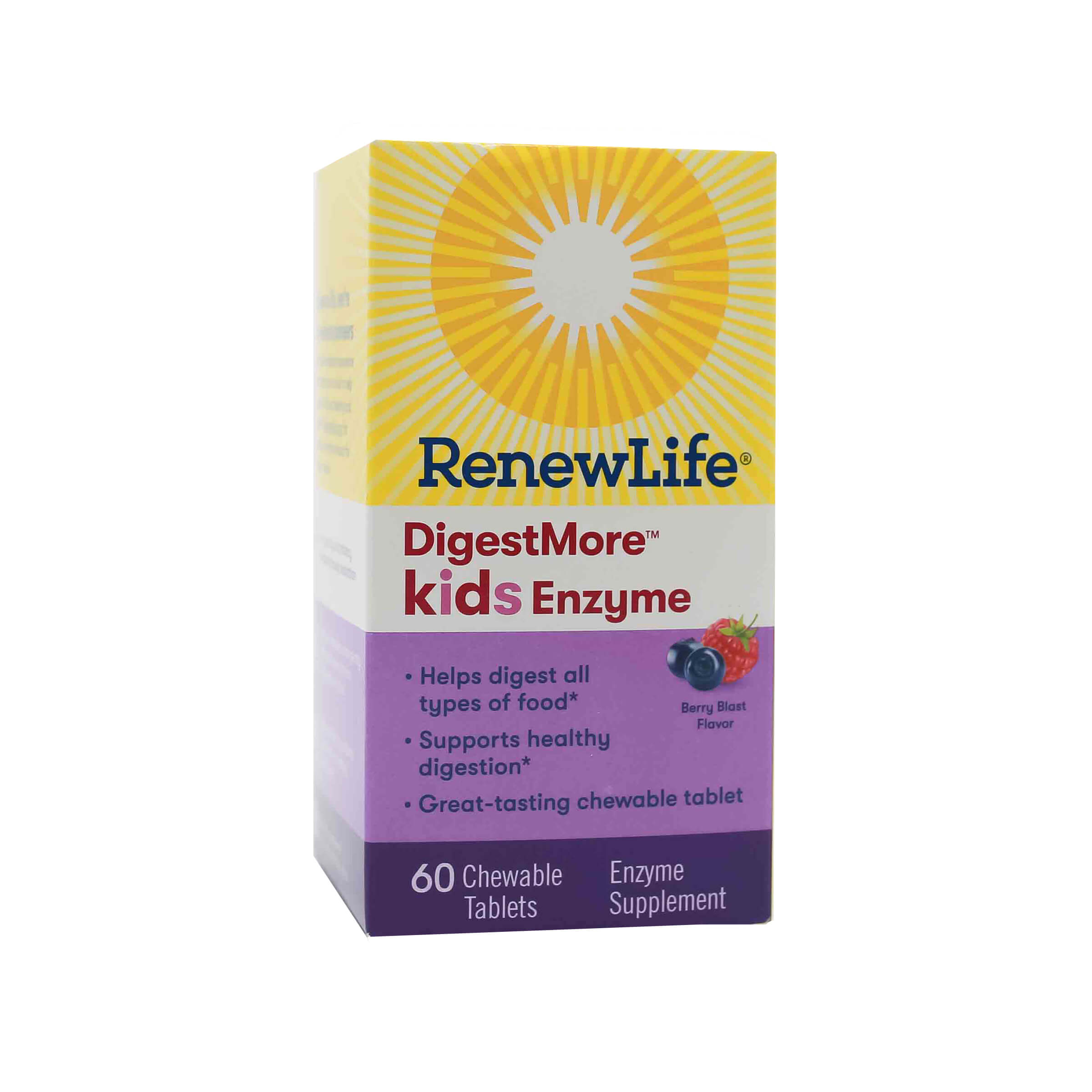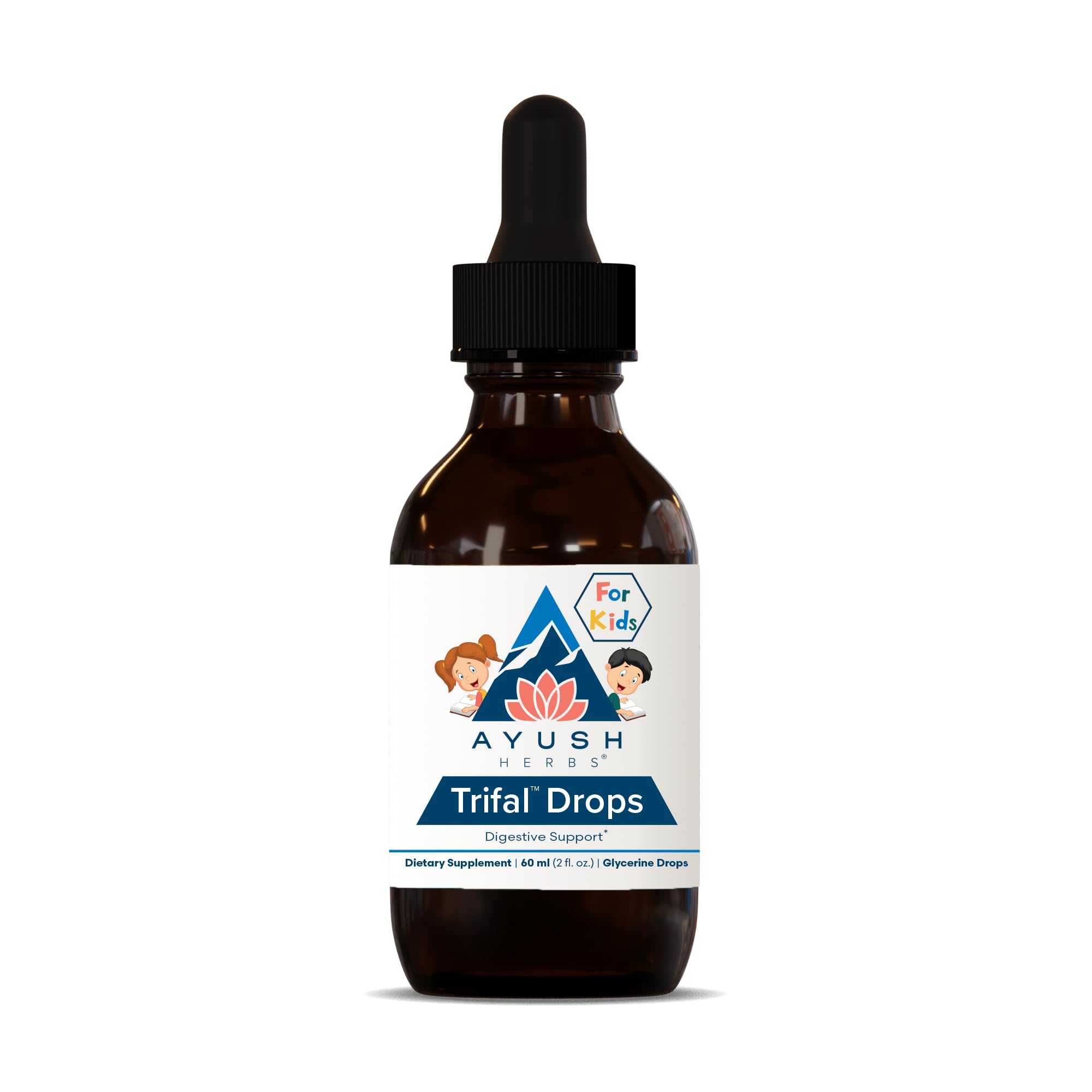Children’s digestive enzymes help break down food into nutrients. They support healthy digestion and nutrient absorption in kids.
Digestive enzymes play a crucial role in children’s health by aiding in the breakdown of food into essential nutrients. These enzymes, produced naturally in the digestive system, help ensure that children can efficiently absorb vitamins, minerals, and other vital compounds from their diet.
A deficiency in these enzymes can lead to digestive issues such as bloating, gas, and discomfort. Supplementing with children’s digestive enzymes can support a healthy digestive process, especially for those with specific dietary needs or digestive challenges. Ensuring kids have adequate digestive enzyme support can promote better overall health and well-being.
Role Of Digestive Enzymes
Children’s digestive enzymes play a crucial role in helping young bodies break down food into nutrients. These enzymes ensure that children get the most out of their meals, aiding in growth and development. Understanding the role of digestive enzymes can help parents ensure their kids maintain a healthy digestive system.
Importance In Digestion
Digestive enzymes are essential for breaking down food so the body can absorb nutrients. For children, this process is vital for growth and development. Without these enzymes, their bodies can’t efficiently extract vitamins, minerals, and other nutrients from food.
Here are some key roles of digestive enzymes in digestion:
- Breaking Down Food: Enzymes break down complex food molecules into simpler forms. This makes it easier for the body to absorb nutrients.
- Absorbing Nutrients: Proper digestion ensures that essential nutrients like proteins, fats, and carbohydrates are available for absorption.
- Preventing Discomfort: Adequate enzyme activity helps prevent digestive discomforts like bloating, gas, and indigestion.
In children, digestive enzymes are even more important. Their growing bodies need all the nutrients they can get. Ensuring they have enough enzymes can prevent nutritional deficiencies.
Here’s a simple table summarizing the importance of digestive enzymes:
| Role | Importance |
|---|---|
| Breaking Down Food | Ensures easier nutrient absorption |
| Absorbing Nutrients | Provides essential vitamins and minerals |
| Preventing Discomfort | Avoids bloating and indigestion |
Types Of Enzymes
There are different types of digestive enzymes, each with a specific function. Knowing these can help parents understand what their children need.
Here are the main types of digestive enzymes:
- Amylase: Breaks down carbohydrates. Found in saliva and pancreatic juices. Helps convert starches into sugars.
- Protease: Breaks down proteins. Found in the stomach, pancreas, and intestines. Converts proteins into amino acids.
- Lipase: Breaks down fats. Secreted by the pancreas. Converts fats into fatty acids and glycerol.
- Lactase: Breaks down lactose. Found in the small intestine. Converts lactose into glucose and galactose.
Each enzyme has a unique role. Amylase is crucial for digesting starchy foods like bread and pasta. Protease helps in breaking down protein-rich foods like meat and beans. Lipase is essential for fatty foods like butter and oils. Lactase is important for digesting dairy products like milk and cheese.
Understanding these enzymes can help parents make better dietary choices for their kids. Ensuring a balanced diet that supports enzyme activity can promote better digestion and nutrient absorption.

Credit: findyourhealthyplace.com
Enzymes In Infancy
Children’s digestive enzymes play a crucial role in their growth and development. Enzymes help break down food into nutrients that the body can absorb. In infancy, these enzymes are essential as babies transition from milk to solid foods. This period is critical for their digestive health.
Breast Milk Benefits
Breast milk is often called “liquid gold” for a reason. It contains numerous digestive enzymes that help infants break down and absorb nutrients efficiently. Here are some key enzymes found in breast milk:
- Lipase: Helps break down fats into fatty acids and glycerol, making them easier to absorb.
- Amylase: Assists in breaking down carbohydrates into simple sugars, providing quick energy.
- Protease: Breaks down proteins into amino acids, which are the building blocks of growth.
These enzymes support the infant’s developing digestive system. They also help in building a strong immune system. Studies show that breastfed babies have fewer digestive issues and infections. The natural enzymes in breast milk make it easier for babies to digest. This reduces the risk of colic and other digestive problems.
Here’s a quick look at the enzymes and their benefits:
| Enzyme | Function | Benefit |
|---|---|---|
| Lipase | Breaks down fats | Improves fat absorption |
| Amylase | Breaks down carbohydrates | Provides quick energy |
| Protease | Breaks down proteins | Supports growth |
Breast milk is perfectly designed to meet an infant’s nutritional needs. It provides the right balance of enzymes, making digestion smooth and efficient.
Introducing Solids
Introducing solid foods is a significant milestone in an infant’s life. This process usually starts around six months of age. At this stage, the baby’s digestive system is still developing. Therefore, digestive enzymes play a vital role in this transition.
When introducing solids, it is important to start with single-ingredient foods. This helps the baby’s digestive system adjust gradually. Common first foods include:
- Pureed fruits
- Mashed vegetables
- Rice cereal
These foods are easy to digest and less likely to cause allergic reactions. Over time, you can introduce more complex foods. As the variety of foods increases, the need for different enzymes also grows. The body starts producing more amylase to handle starches and more protease for proteins.
Parents can support their baby’s digestion by offering enzyme-rich foods. For example, bananas contain natural amylase, and avocados provide healthy fats that lipase can break down. These foods help the baby’s digestive system work efficiently.
Here’s a simple guide for introducing solids:
| Age | Foods | Enzyme Support |
|---|---|---|
| 6-8 months | Pureed fruits and vegetables | Amylase (fruits), Lipase (avocado) |
| 8-10 months | Mashed grains, soft proteins | Amylase (grains), Protease (protein) |
| 10-12 months | Chopped foods, finger foods | All enzymes increase |
By paying attention to the types of foods and their enzyme content, parents can help their child develop a healthy digestive system. This foundation supports overall well-being and growth.
Common Digestive Issues
Children often face digestive issues due to their developing bodies. Children’s digestive enzymes play a crucial role in helping break down food into nutrients. Understanding common digestive issues can help parents manage their child’s health better.
Symptoms To Watch
Parents should monitor their children for common digestive problems. Signs of digestive issues can vary but often include:
- Frequent stomach pain
- Bloating or gas
- Diarrhea or constipation
- Vomiting or nausea
- Poor appetite
Stomach pain is a common symptom. Children might complain of a tummy ache or hold their stomach. This could indicate indigestion or other issues.
Bloating and gas can also signal digestive problems. If a child feels full or their belly looks swollen, it might be a sign of poor digestion.
Diarrhea or constipation can be distressing for both children and parents. Frequent diarrhea may lead to dehydration. Constipation can cause discomfort and pain.
Vomiting and nausea are more severe symptoms. They can indicate a more serious issue and may require immediate attention.
Poor appetite can result from digestive issues. If a child is not eating well or seems to have lost interest in food, it could be a sign of digestive discomfort.
When To Seek Help
Knowing when to seek medical help is vital. Some situations require prompt attention from a healthcare professional:
- Persistent or severe stomach pain
- Blood in stool or vomit
- Unexplained weight loss
- High fever with digestive symptoms
- Dehydration signs like dry mouth or no tears when crying
Persistent or severe stomach pain should never be ignored. It could signal a more serious condition like appendicitis or a blockage.
Blood in stool or vomit is a critical sign. This requires immediate medical evaluation to rule out serious conditions.
Unexplained weight loss is concerning. If a child is losing weight without a clear reason, it could indicate a digestive disorder.
High fever with digestive symptoms can suggest an infection. It’s important to seek medical advice to prevent complications.
Dehydration signs should be monitored closely. Symptoms like dry mouth, no tears, or fewer wet diapers in infants indicate a need for medical intervention.

Credit: www.amazon.ca
Dietary Sources Of Enzymes
Children’s digestive enzymes play a crucial role in breaking down food into nutrients. These enzymes help children absorb vitamins and minerals efficiently. Dietary sources of enzymes can greatly support this process. Discovering these sources can improve your child’s digestion naturally.
Fruits And Vegetables
Fruits and vegetables are excellent sources of digestive enzymes. They provide essential vitamins and minerals. Papaya contains the enzyme papain, which helps break down proteins.
- Pineapple: Contains bromelain, aiding in protein digestion.
- Bananas: Offer amylase and maltase for carbohydrate digestion.
- Avocado: Rich in lipase, helping fat digestion.
Vegetables also have a bounty of enzymes. Raw vegetables are particularly beneficial. Cooking can destroy some enzymes, so raw consumption is ideal.
| Vegetable | Enzyme |
|---|---|
| Broccoli | Myrosinase |
| Cabbage | Diastase |
| Carrots | Sucrase |
Incorporating a variety of fruits and vegetables in your child’s diet can boost their enzyme intake. This can enhance their digestion and nutrient absorption.
Fermented Foods
Fermented foods are another rich source of digestive enzymes. They are produced by the natural process of fermentation. This process enhances enzyme availability.
- Yogurt: Contains lactase, which helps digest lactose.
- Kefir: A fermented milk drink rich in various digestive enzymes.
- Sauerkraut: Fermented cabbage that offers a range of enzymes.
Fermented foods also promote a healthy gut flora. This supports overall digestion and nutrient absorption. Including them in your child’s diet can be highly beneficial.
Fermented foods can be easily integrated into meals. A small bowl of yogurt with fruits can be a tasty snack. Sauerkraut can be added to sandwiches or salads.
Offering a variety of fermented foods ensures a good mix of enzymes. This can help your child’s digestive system function optimally.
Supplement Options
Children’s digestive enzymes can play a key role in supporting healthy digestion. The right supplement options can ensure your child gets the nutrients they need for growth and development. Knowing when to consider these supplements and understanding the types available is essential for making an informed choice.
When To Consider Supplements
Parents might consider digestive enzyme supplements for their children in several situations. Here are some scenarios where these supplements could be beneficial:
- Frequent Digestive Issues: If your child has frequent stomachaches, bloating, or gas, digestive enzymes might help.
- Food Sensitivities: Children with lactose intolerance or gluten sensitivity can benefit from specific enzymes that break down these substances.
- Poor Nutrient Absorption: If your child is not gaining weight or growing as expected, they might not be absorbing nutrients properly.
- Chronic Conditions: Conditions like cystic fibrosis or irritable bowel syndrome can disrupt digestion, making enzyme supplements necessary.
It’s important to consult with a healthcare provider before starting any supplement. They can help identify if digestive enzymes are the right choice for your child’s needs.
Types Available
There are various types of digestive enzyme supplements available for children. Each type targets specific digestive needs:
- Protease: Breaks down proteins into amino acids. Useful for children with protein digestion issues.
- Amylase: Helps in digesting carbohydrates. Important for children who have trouble with starchy foods.
- Lipase: Assists in the digestion of fats. Beneficial for kids who have difficulty absorbing fats.
- Lactase: Breaks down lactose, the sugar in milk. Ideal for lactose-intolerant children.
- Cellulase: Aids in breaking down fiber from fruits and vegetables. Useful for children who need help digesting plant-based foods.
These enzymes are available in various forms, such as chewable tablets, capsules, and powders. Here’s a quick comparison:
| Form | Pros | Cons |
|---|---|---|
| Chewable Tablets | Easy to take, kid-friendly flavors | May contain added sugars |
| Capsules | Precise dosage, no taste | Harder for young kids to swallow |
| Powders | Can be mixed with food/drinks | May alter taste of food |
Choosing the right type depends on your child’s specific needs and preferences. Always read labels and consult with a healthcare provider to ensure safety and effectiveness.
Promoting Healthy Digestion
Children’s digestive enzymes play a crucial role in promoting healthy digestion. These enzymes help break down food into nutrients that the body can use. Ensuring kids have a healthy digestive system aids in their overall growth and development. Below are some essential tips on promoting healthy digestion through a balanced diet and proper hydration.
Balanced Diet Tips
A balanced diet is key to maintaining healthy digestion in children. Here are some tips to ensure your child gets the nutrients they need:
- Include a variety of fruits and vegetables: These are rich in fiber, vitamins, and minerals. Aim for at least five servings a day.
- Whole grains are essential: Foods like brown rice, oats, and whole wheat bread provide important fiber that aids digestion.
- Protein is crucial: Incorporate lean meats, beans, and legumes. These help in muscle growth and repair.
- Dairy for calcium: Milk, cheese, and yogurt are important for bone health. Choose low-fat options for older children.
- Limit sugary snacks and drinks: Too much sugar can lead to digestive issues. Opt for healthier snacks like fruits and nuts.
Here’s a simple table to illustrate a balanced meal plan for a child:
| Meal | Food Group | Example |
|---|---|---|
| Breakfast | Whole Grains | Oatmeal with berries |
| Lunch | Protein | Grilled chicken with veggies |
| Snack | Fruits | Apple slices |
| Dinner | Dairy | Low-fat yogurt |
Hydration Importance
Proper hydration is vital for healthy digestion in children. Water helps move food through the digestive tract and prevents constipation. Here are some tips to keep your child hydrated:
- Encourage regular water intake: Children should drink water throughout the day. Aim for at least 6-8 cups daily.
- Offer water-rich foods: Foods like cucumbers, oranges, and watermelon help keep your child hydrated.
- Avoid sugary drinks: Sodas and juices can lead to digestive problems. Water and milk are better choices.
- Make hydration fun: Use colorful cups or water bottles to make drinking water more appealing.
- Set reminders: Remind your child to drink water, especially during playtime or after physical activities.
Here’s a quick hydration checklist:
- Drink water before, during, and after meals.
- Carry a water bottle to school.
- Choose water over sugary drinks.
- Eat water-rich fruits and veggies.
Ensuring your child stays hydrated supports their digestive health and overall well-being.

Credit: www.amazon.com
Frequently Asked Questions
Is It Ok For Kids To Take Digestive Enzymes?
Consult a pediatrician before giving digestive enzymes to kids. Safety and dosage depend on individual health needs and conditions.
Is There A Downside To Taking Digestive Enzymes?
Taking digestive enzymes can cause side effects like nausea, diarrhea, and abdominal pain. They may interact with medications. Always consult a doctor before use.
What Are Enzymes In Digestion For Kids?
Enzymes in digestion help break down food into smaller parts. They turn food into nutrients our bodies can use. These special proteins speed up the digestion process. Kids’ bodies produce enzymes in the mouth, stomach, and intestines. Enzymes are essential for healthy digestion and energy.
What Is Digestive Enzyme Deficiency In Kids?
Digestive enzyme deficiency in kids is a condition where their bodies lack enzymes needed to properly digest food. This can lead to symptoms like bloating, gas, and malnutrition. Proper diagnosis and treatment are essential for managing the condition effectively.
What Are Children’s Digestive Enzymes?
Children’s digestive enzymes are supplements that aid in breaking down food into nutrients for absorption.
Why Are Digestive Enzymes Important For Kids?
Digestive enzymes help kids absorb nutrients efficiently, promoting healthy growth and development.
Conclusion
Supporting your child’s digestive health is essential for their overall well-being. Digestive enzymes can help improve nutrient absorption and ease discomfort. Always consult a healthcare professional before starting any supplement. Prioritize a balanced diet and healthy lifestyle to promote optimal digestion.
Your child’s health journey starts with informed choices.





















